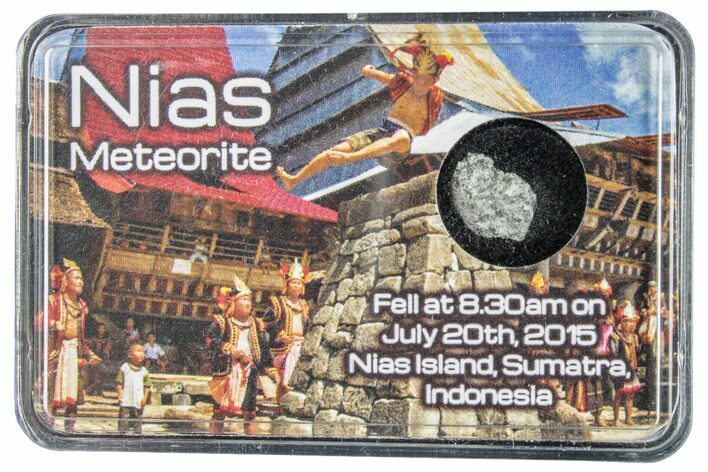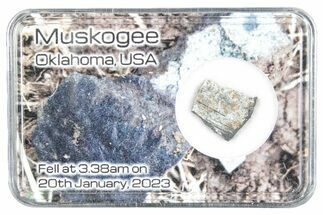.31" Botohilitano Meteorite Fragment (0.24 g) - 2015 Witnessed Fall
This is a fragment from the LL5 chondrite known as Botohilitano (also Nias), which fell near the town of the same name in Indonesia on the morning of July 20, 2015. It comes in its own labeled display case.
Botohilitano, also known as Nias, is the name given to an LL5 chondrite meteorite that fell in the town of the same name on the island of Nias in Indonesia in 2015. Around 8:30 AM on July 20 that year, a woman observed an object falling from the sky into a rice farmer's field. She informed the landowner, who eventually discovered a single 5.8-kilogram stone and kept it as a token of good fortune for about a year. It was then sold in June 2021.
Botohilitano is a gorgeous example of a classic chondrite: it is fusion-crusted and packed with gray chondrules in a lighter gray matrix with varied evidence of metal staining.
Botohilitano is a gorgeous example of a classic chondrite: it is fusion-crusted and packed with gray chondrules in a lighter gray matrix with varied evidence of metal staining.
What Is An L5 Chondrite?
An L5 chondrite is a type of stony meteorite that falls under the "L" (low iron) chondrite group. L chondrites have lower iron content (around 7-11% iron, mostly in the form of iron sulfide or silicates) and typically show less metal than H chondrites (high iron chondrites). They primarily consist of silicate minerals like olivine and pyroxene.
The "5" rating indicates a high degree of thermal metamorphism. This means that the L5 chondrite experienced substantial heating, likely on its parent asteroid, which caused partial recrystallization of minerals. As a result, the original chondrules (small, rounded particles) are less distinct and partially altered, though still visible. L5 chondrites usually have a light to medium gray matrix, and the chondrules tend to be less clearly defined due to metamorphic alteration. You may still see rounded chondrule outlines, but they appear partially integrated with the surrounding matrix.
The L chondrite group is believed to come from a specific parent body in the asteroid belt, which likely experienced a major collisional event. This event may have sent large quantities of L chondritic material into space, resulting in the abundance of L chondrites found on Earth.
An L5 chondrite is a type of stony meteorite that falls under the "L" (low iron) chondrite group. L chondrites have lower iron content (around 7-11% iron, mostly in the form of iron sulfide or silicates) and typically show less metal than H chondrites (high iron chondrites). They primarily consist of silicate minerals like olivine and pyroxene.
The "5" rating indicates a high degree of thermal metamorphism. This means that the L5 chondrite experienced substantial heating, likely on its parent asteroid, which caused partial recrystallization of minerals. As a result, the original chondrules (small, rounded particles) are less distinct and partially altered, though still visible. L5 chondrites usually have a light to medium gray matrix, and the chondrules tend to be less clearly defined due to metamorphic alteration. You may still see rounded chondrule outlines, but they appear partially integrated with the surrounding matrix.
The L chondrite group is believed to come from a specific parent body in the asteroid belt, which likely experienced a major collisional event. This event may have sent large quantities of L chondritic material into space, resulting in the abundance of L chondrites found on Earth.
$495
TYPE
Ordinary Chondrite (LL5)
LOCATION
Botohilitano, Nias, North Sumatra, Indonesia
SIZE
.31" wide, Weight: 0.24 grams
CATEGORY
ITEM
#285847
 Reviews
Reviews









